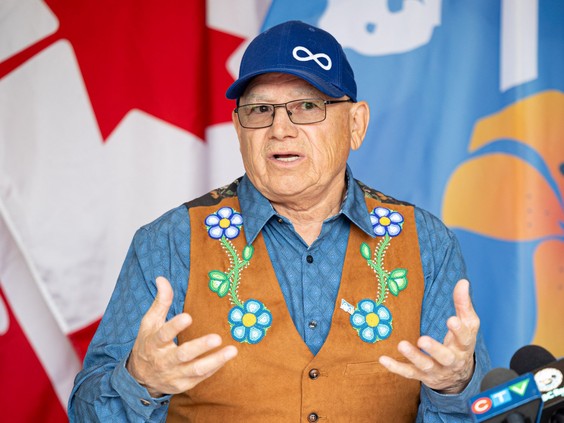
It’s a constitutional guarantee of MN-S jurisdiction over “core governance matters” like education, language and child and family services.
Julia Peterson
Saskatoon StarPhoenix
Métis Nation—Saskatchewan is negotiating a treaty with the Government of Canada to cement the right to self-governance for Métis people in Saskatchewan.
This would be a constitutional guarantee of MN-S’s jurisdiction over “core governance matters” like education, language and child and family services, MN-S President Glen McCallum said on Monday.
“This is our moment,” McCallum said. “For many years, we’ve watched the Metis Nation grow, and especially in the last seven years, we’ve grown very fast in regards to the relationship that we’ve built with the federal government, provincial government, industry and institutions.
“(And) when you hit Treaty, it’s all the rights that we’ve always wanted, without having the federal government nickel-dime us, and not being able to have the right capacity to deal with our people.”
Over the summer, Métis citizens in the province will have the chance to review the text of this modern treaty — “Kischi mashinahikan ooschi Michif, the Sacred Document from the Michif” — before voting on whether to ratify the document in the fall.
If the vote passes, MN-S anticipates the treaty would be implemented in federal legislation in 2025.
MN-S Vice-President Michelle LeClair said “ongoing negotiations with Canada over the last five years” and a series of self-government agreements have laid the groundwork for this treaty.
The dream of a nation-to-nation agreement between Métis people in Saskatchewan and the federal government is much older than that.
“This is 150 years in the making,” LeClair said. “Our communities have fought and died for this very thing that we are doing today.”
Elder Norman Fleury said seeing this treaty within reach makes him proud of his Métis heritage, and full of hope for future generations.
“Our people have been talking about this since our existence; under Louis Riel and his council, we always talked about this,” said Fleury. “(So) when I see this, the adrenaline flows in my veins — no different than when we talk about Louis Riel.”
Most of all, Fleury said, this treaty would mean that he can watch his young grandchildren grow up as citizens of a self-governing Métis nation, knowing that their ancestors and forebears fought hard for their rights and ultimately won.
“If I ever passed away today or tomorrow, I’ll be happy to say that Michif culture is well alive, and we got it documented through our documents that we have,” Fleury said. “It’s alive. We’re using it. It’s no longer that wish; the dream is alive and well.”
In the months ahead, Fleury said he will also be thinking about his grandparents, born in the 1800s, and how proud they would have been.
“They would say, ‘We’ve come a long ways since the time that we had to go through resistances to fight for our rights, to empower ourselves to where we are,’ ” he said. “And I know … when I go home someday to where they are, we’re going to be having a party. And we’re going to have a ceremony. And they’ll say, ‘You listened really well and left something for your grandchildren, like we did with you.’”
Over the next few months, MN-S representatives will travel to Métis communities throughout the province, sharing the draft of the self-government agreement and discussing it with citizens.
Currently, MN-S has jurisdiction over its citizenship, elections and core governance under a set of agreements with the federal government, but a treaty would enshrine those agreements in perpetuity — no matter what changes in political power may take place — and guarantee stable funding for core areas of jurisdiction.
To Fleury, the self-government agreement is much more than words on the page, or even a legal agreement between nations.
“This is a nationality,” he said. “It’s a nation. It’s a people, with a language and a culture; with all our flag stories, all our songs, our ceremonies, our legends, our mythology.”

